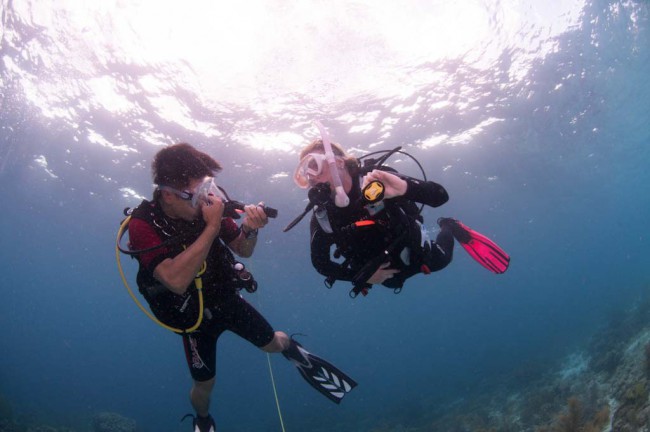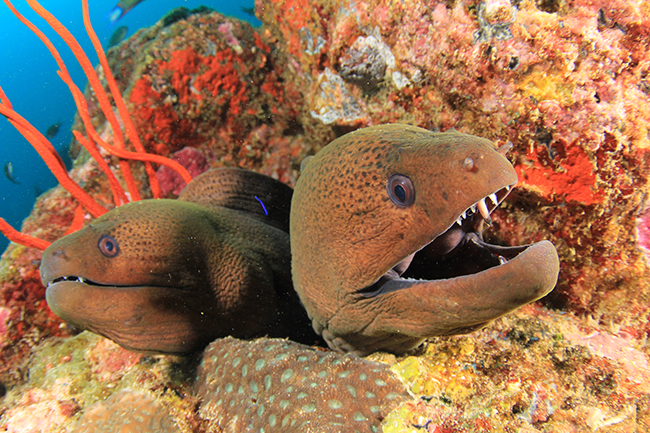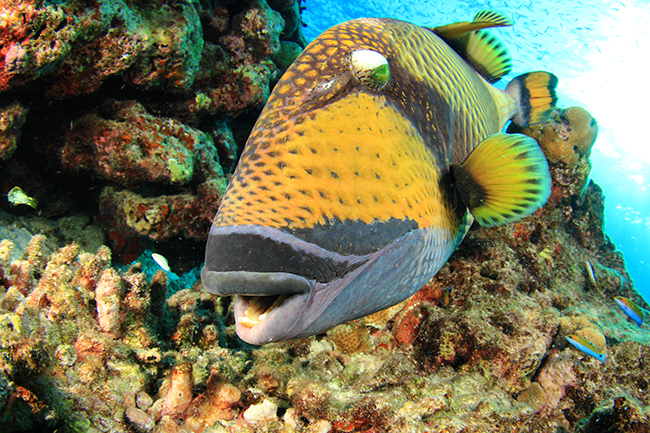After I finished my final Open Water Diver certification dive, I thought, “I’m never doing this again.” Even though I loved being immersed in the ocean and seeing sea creatures in their natural habitat. I Just. Didn’t. Like. Scuba. Diving…or so I thought.
Looking back, I realize my dislike was simply discomfort. During every dive I had one hand on my inflator hose and another on my nose — over-adjusting my buoyancy and trying to get my #*%@-ing ears to equalize.

What did I do? I waited six months before making
. So why does scuba diving make some people feel anxious?In my experience — as a formerly nervous diver and later a PADI Instructor — scuba diving anxiety is caused by one or more of these things:
Uncertainty — due to lack of experience or skills Fear of marine life Worst-case-scenario worries Dive buddy disconnectWhat finally cured my scuba diving anxiety? Becoming a Rescue Diver. I’m not saying that’s what everyone has to do, but that’s what worked for me.
The Rescue Diver class was surprisingly fun and, by the end, my brain full of worries was replaced with soothing how-to’s. Like:
How to identify and prevent problems Self-rescue techniques What to do if my buddy had an emergencyPlease don’t misunderstand – I learned the skills listed above in my Open Water Diver class. I just didn’t have the confidence I’d remember what to do and how to do it when the moment arrived. After doing the Rescue Diver course, I felt more confident and prepared.
To be fair, if you’d told me I needed to take Advanced Open Water Diver and then Rescue Diver just after I finished my Open Water Diver course, I would have told you to take a long walk off a short pier.
Here’s the point: keep diving.
If you like the idea of being a scuba diver but struggle with some aspect of diving, know that it gets easier and you’ll enjoy diving more as you gain experience.
Find a supportive dive buddy (more on that in a moment) Choose an easy dive site Make a couple of divesIf you don’t feel comfortable diving just you and a buddy, the best thing to do is enroll in a PADI continuing education course. I know, I know. This is an article on PADI’s website, so of course that’s what I’m going to say. But, it’s true.
Additional training is the best way to gain experience, build confidence and reduce anxiety. This applies to other sports too: rock-climbing, circus arts, skiing, snowboarding, etc.
I highly recommend Peak Performance Buoyancy for beginner divers or anxious divers. Improving your buoyancy is one of the best ways to feel more comfortable underwater.
You’ll start in a pool (or pool-like environment), then make two dives in open water with a PADI Professional by your side. Something to consider: if you had a group class for your Open Water Diver certification course and would have preferred more one-on-one support, consider booking a private or semi-private specialty class.
Real talk: my first PADI Instructor did not put me at ease. As one example, I was terrified of moray eels and he kept urging me to swim down and get closer to one. If you didn’t like your first instructor, dive with someone else. It makes a world of difference, trust me.

My Advanced Open Water Diver Instructor was patient, helpful and empathetic. Being in a class with other beginner divers also helped me understand that everyone is on their own scuba journey. One guy couldn’t dive longer than 20 minutes because he was an “air hog.” Another guy was a bicycle kicker. I had equalization problems. Over the course of the class, we all got a little better.
Which leads me to my next point…
Some people fall in love with diving the moment they take their first breath underwater. They are instantly comfortable with the equipment and all the underwater skills.
My first dive buddy/boyfriend was one of those people. He convinced me to get certified and couldn’t understand why I didn’t instantly love scuba diving.
At one point he said, “I’m not saying you’re ruining our vacation but…..”
Looking back, I should have broken up with him right then joined a local dive club or enrolled in a continuing education course.
There are many different types of dive buddies. If you’re apprehensive about diving with your buddy on your own, find a local dive club or sign up for a PADI Club™ dive trip. You’ll find a supportive community for you and your dive buddy.
For many people, a fear of sharks prevents them from learning to scuba dive or even putting one toe in the ocean. But once you learn more about our finned friends or see one on a dive, it’s easy to overcome a fear of sharks.
If you had a bad experience…maybe you were stung by a jellyfish while snorkeling or saw a diver get nipped by a titan triggerfish…take precautions such as wearing a dive skin to minimize skin exposure and avoiding titan triggerfish nesting areas.
It’s also totally okay to just opt out of certain dive sites. Personally, I have an irrational fear of sea snakes. When I saw PADI’s list of the best places to dive with sea snakes, I thought, “Here is a list of places I will never dive.” I know I’m missing out on some gorgeous dives in those areas, but fortunately there are other places to go.
We live on a big, blue planet with thousands of amazing dive sites. Don’t let fears about a particular animal prevent you from seeing the other fascinating marine life beneath the waves.
Here are some tips for people who feel anxious before diving.
By “diver-friendly”, I mean a spot that doesn’t have the potential for big waves, bad visibility, heavy current, etc. If you’re not familiar with the area or don’t have a dive buddy, book a Discover Local Diving experience with a PADI Professional.
If it’s within your budget, you could even stay at a wellness resort that offers diving. Spend the morning diving in crystal clear water then get a massage afterwards. What’s not to like?
Talk to other divers who are stoked about the diving area you’re about to experience. Review essential scuba skills from your Open Water Diver eLearning materials or sign up for a PADI ReActivate® scuba refresher Watch something to inspire you, such as: BBC’s Blue Planet, DisneyNature: Oceans, Finding Nemo, etc. Avoid alcohol (it’s a depressant) Don’t get in a downward spiral of thoughts Get plenty of rest If you’re predisposed to seasickness, start medicating the night before Dial back the caffeine in the morning Give yourself plenty of time to get to the dive shop/site, park, use the loo, etc. Breathe slowly and deeply, never hold your breathOne last tip: owning your own scuba gear makes a huge difference. Investing in gear may seem like a big ask if (like me) you didn’t enjoy your Open Water Diver class. But having a BC you’re familiar with, a mask that doesn’t leak, etc. will significantly increase your comfort and enjoyment.
As someone who suffered from scuba diving anxiety for quite a while, I sincerely hope these tips will be helpful. If, deep down you feel the call of the ocean, don’t give up on diving. With time and experience, I promise it gets easier and more enjoyable. Future you will thank you.
Book a Dive Trip to Gain Experience
Share This
